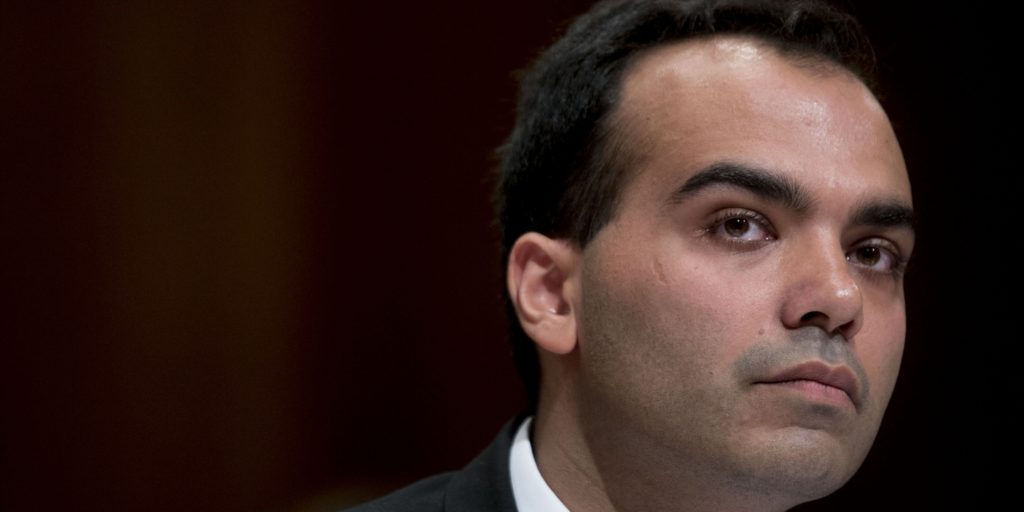PRESSURE ON DEMOCRATS PAYS OFF AS CHUCK SCHUMER PICKS CONSUMER ADVOCATE FOR FTC NOMINEE

David Dayen
theintercept.com
AFTER PRESSURE FROM consumer advocates, Senate Minority Leader Chuck Schumer has recommended Rohit Chopra, a former official at the Consumer Financial Protection Bureau (CFPB), for an open Democratic seat on the Federal Trade Commission (FTC).
As reported by The Intercept in March, Schumer had previously been considering his ex-Chief of Staff David Hantman — a former lobbyist for Yahoo and Airbnb who opposed regulation on Silicon Valley firms — for the position. After details of Hantman’s past work became public, Schumer last month told the International Business Times that he would not be submitting Hantman’s name.
Chopra, by contrast, has a strong record of action on consumer issues. A senior fellow at the Consumer Federation of America (CFA), Chopra was one of the first hires at CFPB, when Sen. Elizabeth Warren was standing up the bureau. As part of the senior leadership, Chopra eventually served as student loan ombudsman, working on financial aid, student debt defaults, and misconduct by loan servicers. Since 2011, CFPB has secured refunds of hundreds of millions of dollars for students, and created a Financial Aid Shopping Sheet to better inform would-be debtors of their options.
Later on, Chopra became a special adviser to the Department of Education on higher education policy. He was named to the Clinton transition team, as an olive branch to progressives. At CFA, he has focused on financial issues affecting military families, who are often preyed upon by unscrupulous lenders. When he was being considered to run New York’s Department of Financial Services, Sen. Warren called Chopra “smart as a whip, independent, hard-working, and loaded with integrity.”
At the FTC, Chopra would deal with a wide range of issues, from preventing unfair and deceptive business practices, to ensuring competition in markets and accuracy in advertising and marketing information.
“The Federal Trade Commission should be led by people who put the interests of consumers above all else, and that’s what Rohit Chopra has done his entire life,” said Sen. Schumer in a statement. “I strongly urge the president to nominate him and will push for his swift confirmation in the Senate.”
Though President Trump makes the final decision on nominees for federal agencies, agency rules give Democrats an opportunity to name members. On several five-member commissions — like the Federal Communications Commission, Commodity Futures Trading Commission, Securities and Exchange Commission, Federal Energy Regulatory Commission, and the FTC — no more than three members can be from the president’s party. The Federal Election Commission’s six members are supposed to be evenly split among the parties. This is designed to give some weight to diverse viewpoints.
Right now, there are open vacancies that cannot go to Republicans on every one of those six boards, except for the Federal Energy Regulatory Commission.
Traditionally, the minority leader in the Senate — Schumer — has wide discretion to recommend minority-party commission members, who the president then nominates. These nominations matter, because while minority party panel members routinely get outvoted, they can create a record of opposition and carry the banner for the party’s ideas and principles. Plus, when the presidency changes parties, those remaining commission members are first in line to take the chairmanships.
Ajit Pai, a longtime Republican FCC commissioner, became chair under Trump, and he has been among the most active ideologues in the federal government, moving aggressively to relax media ownership, limit assistance to low-income broadband users, and overturn net neutrality.
Democrats have not always installed mainstream progressives aligned with the party’s putative values onto these commissions, occasionally opting for business-friendly nominees who collaborate with Republicans and industry to deregulate. Schumer’s initial consideration of Hantman suggested a continuation of this trend.
But the Chopra pick shows that Schumer will respond to progressive pressure. Chopra’s background suggests alignment with the Warren wing of the Democratic caucus on the need to safeguard consumers, resist monopolies, and prevent predatory corporate behavior.
The final hurdle will be getting Trump to actually nominate Chopra. While tradition dictates that the minority party gets a say in choosing minority members of these commissions, Trump is anything but a traditional president. Theoretically he could nominate registered independents with conservative leanings to get around the statutory limitation on party members.
But this would trigger an equal reaction in future presidencies. Conservatives may fear being silenced on these regulatory agencies in the future as much as liberals, leading to a détente of sorts.
Regardless of that outcome, Schumer’s reversal exemplifies the shifts in the Democratic coalition and the importance of consumer protection as a central value.
